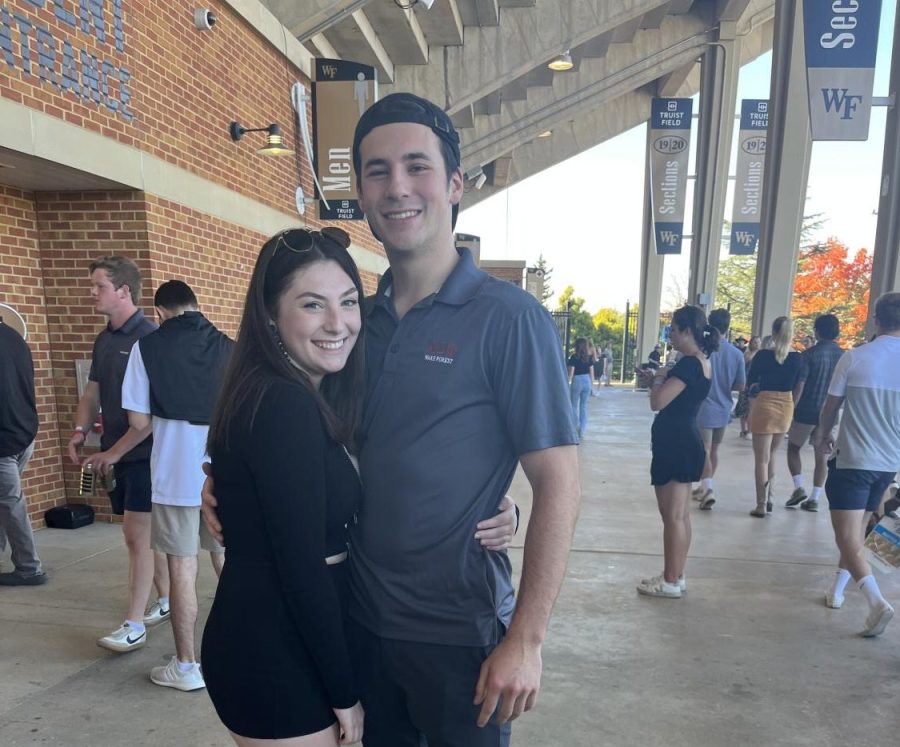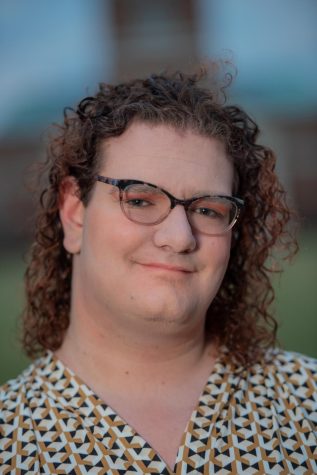It’s a love story, baby, just answer 53 questions
The Marriage Pact is a compatibility test for Wake Forest students looking for love (or at least a backup plan)
Sophomores Stephanie Glaser and Matthew Trosino, who helped bring Marriage Pact to Wake Forest, pose at a football game.
February 15, 2023
Wake Forest junior Ted Bossong is currently abroad in London, England. One night, one of his roommates, who studies at Villanova University in Pennsylvania, found something called Marriage Pact.
As per its website, Marriage Pact is an “unofficial yearly matching” process for college campuses. The goal? Find each student a “marriage backup plan,” or more accurately, someone who a student knows they’re compatible with — just in case they need that information down the line. Marriage Pact measures compatibility with a multi-question survey, whose answers are run through an algorithm. The algorithm spits out compatibility scores, which are used for matches. For example, a heterosexual female will be matched to the most compatible male who would date a woman, a pansexual person would be matched to the most compatible person willing to date someone of their gender.
Bossong, who is currently almost 4,000 miles from campus, saw Marriage Pact as a way to stay connected with Wake Forest.
“Especially being abroad, it’s hard to keep connections with a lot of Wake Forest people,” Bossong said. “And so this is just one more way to stay connected to campus and meet new people, which is always fun.”
Bossong is not alone. As of this publication, Marriage Pact has received 1,265 completed surveys using Wake Forest emails since submissions opened on Monday, according to its website. Marriage Pact Campus Ambassador Stephanie Glaser (‘25), who brought the service to campus alongside fellow sophomore Matthew Trosino, said that the form will stay open until the end of the week. If the first trial is a success, Marriage Pact will return to Wake Forest once a year.
Glaser first heard about Marriage Pact through TikTok.
“I actually saw a TikTok about Marriage Pact at University of Michigan. It was about these two friends, who were just platonic friends and matched with each other on Marriage Pact,” Glaser said. “And they said ‘Let’s give it a try: I guess we’re compatible with each other.’ They’ve ended up being long distance for a couple of years.”
Glaser said that the decision to launch Marriage Pact the week of Valentine’s Day was deliberate — and inspired by Wake Forest students.
“There was a [post on anonymous message board site] Fizz saying ‘Oh, petition for Wake Forest to have a compatibility test during Valentine’s Day week,’” Glaser said. “So we decided that it would be a really cool week to launch Marriage Pact. Last week, we did a bunch of meetings and discussed how we would market it — like what the questions should be.”
During my first attempt, the survey asked me 53 questions. Some questions asked for demographic information (major, class year, race/ethnicity, gender and sexuality). Other questions probed deeper — one asked if I preferred to talk things out with a partner or to keep things to myself. Another asked me how important I found kinky sex in a relationship. At the end of the survey, I was asked to pick three to five questions that mattered most to me.

Some questions are asked to ensure the safety of those marginalized for their race and sexuality, according to Marriage Pact. One question asks whether participants would like to date outside of their race. Marriage Pact claims that this is to protect people of color from racism.
“We agree that we generally shouldn’t empower people to discriminate,” the Marriage Pact website reads. “But some people (especially BIPOC women) have particularly valid reasons for holding racial preferences. In dating contexts, the male gaze — especially the white male gaze — has been considered the default for centuries. Empowering people to tell us they’d prefer to avoid these circumstances reduces the outsize burdens placed on them in racialized dating interactions.”
Another question asks if a participant would be okay with their child coming out as gay — this is intended to root out queerphobia, per Marriage Pact.
For the most part, the questions are straightforward. Except for the demographic questions, participants are asked to rate their agreement with a given statement on a scale of one to seven, with seven being “strongly agree” and one being “strongly disagree.” However, some questions were better worded than others.
“Some of [the questions] were a little bit confusing, I will say, and some of the wording was a little bit confusing, especially with how we’re supposed to respond,” Bossong said. “But overall, I found the experience to be pretty user-friendly and generally quite easy to do, except for those few instances.”
Sophomore Elise Lipezker said she found the questions engaging.
“I thought they were interesting,” she said. “They’re very specific, which was interesting to take because I like personality tests. So I thought it was interesting to get to fill out the whole form and go through the whole process.”
She also enjoyed the information Marriage Pact sends you when you complete the form, which is based solely on personality metrics (I, for one, am in the 98th percentile at Wake Forest for couponing, the 52nd percentile for going hard and the seventh percentile for holding a grudge).
Glaser and Trosino meet with Marriage Pact staff nightly during launch week to discuss marketing and content strategies. The questions, however, do not change from day to day.
One security issue I found was that I was also able to complete the form on behalf of my roommate — with her consent — as there is no mechanism to verify that the email address you enter into the form is actually yours. There also appears to be no guard against repeated attempts, as I was able to complete the form twice.
When asked about these concerns, Glaser noted that the most recent submission will be counted if there are more than one from a single email address. She also said that those who notice that a Marriage Pact form has been filled out for them without consent can contact Marriage Pact’s support email through its website to have it taken down.
Additionally, Associate Dean for Student Conduct Jim Settle told the Old Gold & Black that students who fill out a Marriage Pact survey for someone else without their consent may face honor code violations related to deception if caught. Settle also noted that falsifying another student’s demographic information — such as race or sexuality — could violate Wake Forest’s anti-harassment policies for students.
As the week has gone on, Glaser, Trosino and the Marriage Pact team have added some information about safety to the draft text of matching emails. Glaser confirmed to the Old Gold & Black that Marriage Pact will send out information about safety around sexual consent in matching emails.
“It’s really no different than meeting up with someone from a dating app, like let’s say, Tinder…” Glaser said. “But I brought up that it would be important to make that note, and so [Marriage Pact] said that it is going to put out a statement in the matching emails about [consent].”
According to Glaser, participants may receive their matches next week, but it is not a guarantee. For example, if 1,000 heterosexual students fill out the survey, and 600 of those students are women, then 200 women will be without matches. In that case, Glaser says there will be a waitlist, while those with matches will find out next week. Glaser told the Old Gold & Black that there are no concrete plans yet around the waitlist.
“We’re trying to just get as many people to do it as possible so we can have more even numbers and a more even distribution of submissions between [class years] and gender,” Glaser said.
For now, though, many Wake Forest students anxiously await their perfect match.















